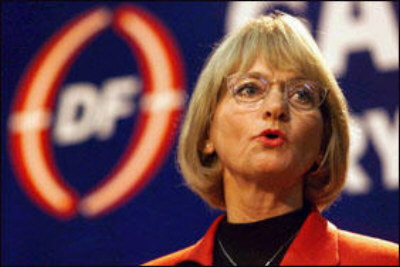 Pia Kjaersgaard’s Danish People’s Party has a genius for attracting attention. Over the past month its campaign to ban public employees from wearing Islamic headscarves has dominated the headlines and also triggered squabbles within most of the country’s other political parties.
Pia Kjaersgaard’s Danish People’s Party has a genius for attracting attention. Over the past month its campaign to ban public employees from wearing Islamic headscarves has dominated the headlines and also triggered squabbles within most of the country’s other political parties.
The campaign began with a poster of a burka-clad woman wielding a judge’s gavel. The implicit message was that Danes risk having their courts invaded by Muslim hordes and sharia law. Birthe Ronn Hornbech, the immigration minister, denounced theDPP as “fanatically anti-Muslim” and said the judiciary was capable of policing its own impartiality and dress code. Stig Glent-Madsen, a high-court judge, confirmed that the judiciary had always managed this itself.
Yet the government, which relies on the DPP‘s support to stay in power, has decided that a new law is needed to ban the wearing of all religious symbols by judges – from Christian crosses to Jewish skullcaps and even Sikh turbans. The hapless Ms Ronn Hornbech will have to frame the law. And the DPP is now calling for even broader bans. Muslim headscarves, says Ms Kjaersgaard, are a “symbol of political Islam and the discrimination against women”. She wants them “out of schools, off the streets and outside the doors of parliament”.
Many Danes share Ms Kjaersgaard’s sentiments. A poll by Megafon for TV2 found 48% in favour of a ban on public employees wearing “religious garb”, and only 39% against.
One response has come from Danish-born Muslims. A poll by Politiken, a daily, of 315 young Muslim students, found that two-thirds of them were considering emigrating after graduation. Most gave as their reason “the tone of the Danish debate about Muslims”.
